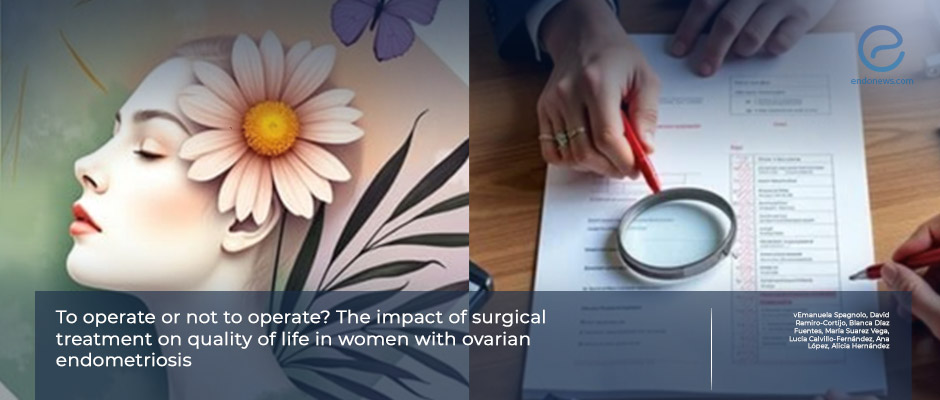Comparing Surgical and Non-Surgical Outcomes in Ovarian Endometriosis
Jul 24, 2025
Surgery May Bridge the Quality of Life Gap in Ovarian Endometriosis, Study Finds
Key Points
Importance:
- Evaluating the effect of surgical versus non-surgical management of ovarian endometriosis is essential to guide patient-centered treatment strategies.
Highlights:
- Surgical treatment of ovarian endometriosis is associated with improved vitality, sexual, and occupational functioning.
- Women with non-operated ovarian endometriosis report quality of life profiles more similar to those with deep endometriosis than to healthy controls.
What's done here:
- A cross-sectional study conducted at La Paz University Hospital (Madrid, Spain) evaluated 40 women aged 25–55:
- 6 with operated ovarian endometriosis (OE-S); 6 with non-operated ovarian endometriosis (OE-NS); 12 with deep endometriosis (DE); 16 healthy controls.
- Health-related quality of life was assessed using validated tools: SF-36, Endometriosis Health Profile-5, Stellenbosch Endometriosis Quality of Life, and Pain Catastrophizing Scale.
- Hematologic and sociodemographic factors were also collected and compared.
Key Results:
- Global health and physical role scores were significantly lower in OE-NS and DE groups compared to controls. OE-Surgery group showed intermediate scores, closer to controls.
- Pain sensitivity was highest in OE-NS (d=2.43) and DE (d=1.18); OE-Surgery did not differ significantly from controls.
- Mental health was significantly impaired in OE-NS compared to controls; not significantly different in OE-Surgery or DE groups.
- Sexual and occupational functioning were significantly better preserved in OE-Surgery compared to OE-NS and DE.
- Reproductive function was most impaired in OE-NS, with significantly lower scores than both controls and OE-Surgery.
- Psychological well-being and endometriosis-specific support were reduced in all endometriosis subtypes.
- Correlation analyses showed OE-Surgery group resembled controls more closely than OE-NS, which clustered with DE.
- Social support perception was reduced in all OE groups; emotional loneliness was particularly notable.
Limitations:
- Small overall sample size with unequal group distribution may limit generalizability. Cross-sectional design precludes conclusions on causality or long-term surgical outcomes. Potential confounding from unmeasured variables (e.g., disease severity, postoperative time frame) was not controlled.
From the Editor-in-Chief – EndoNews
"This study makes one thing clear: surgical treatment of ovarian endometriosis may do more than relieve pain—it can restore vitality, sexual function, and daily well-being. Women who did not undergo surgery showed health profiles nearly identical to those with deep endometriosis, highlighting a hidden burden of conservative management. In contrast, surgically treated patients aligned more closely with healthy controls. These findings elevate quality of life as a central treatment outcome, not a side benefit. Multidisciplinary care and psychosocial support must follow surgery to ensure long-term success."
Lay Summary
Endometriosis often brings chronic pelvic pain, infertility, and diminished quality of life for millions of women.
When this condition affects the ovaries—known as ovarian endometriosis or endometriomas—surgical treatment is frequently considered. But how much does surgery actually improve daily life?
A recent study from La Paz University Hospital in Spain followed 40 women, including those with operated and non-operated ovarian endometriosis, women with deep endometriosis, and healthy controls.
Over a year and a half, researchers assessed their quality of life, mental health, pain levels, and reproductive function using standardized health surveys.
The findings were striking: women with non-operated ovarian endometriosis reported physical and emotional health scores nearly as poor as those with deep endometriosis.
In contrast, those who had surgery fared much better, with outcomes closer to healthy controls—especially in terms of sexual function, occupational wellbeing, and overall vitality.
Importantly, psychological distress and perceived social isolation were common across all women with endometriosis. These findings highlight the critical need for emotional support, individualized care plans, and informed surgical decision-making to improve quality of life.
This study was recently published in Frontiers in Global Women’s Health.
Research Source: https://pubmed.ncbi.nlm.nih.gov/40584729/
ovarian enddometriosis quality of life health profile physiological well-being laparoscopic surgery endometriosis.

